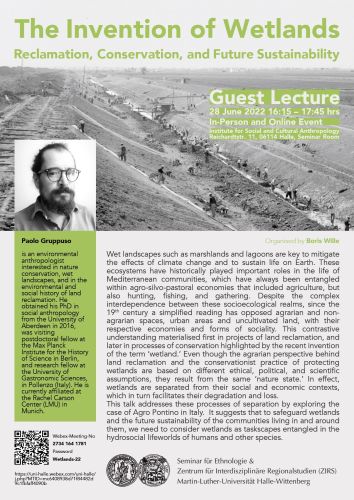
Speaker: Paolo Gruppuso
Organized by Boris Wille
Online & Offline
Seminar für Ethnologie, Reichhardtstraße 11
https://uni-halle.webex.com/uni-halle/
j.php?MTID=mc6408938d71f84482d
9c1fbfaff4090b
Webex-Meeting-No: 2734 164 1781
Password: Wetlands-22
Wet landscapes such as marshlands and lagoons are key to mitigate
the effects of climate change and to sustain life on Earth. These
ecosystems have historically played important roles in the life of
Mediterranean communities, which have always been entangled
within agro-silvo-pastoral economies that included agriculture, but
also hunting, fishing, and gathering. Despite the complex
interdependence between these socioecological realms, since the
19th century a simplified reading has opposed agrarian and nonagrarian
spaces, urban areas and uncultivated land, with their
respective economies and forms of sociality. This contrastive
understanding materialised first in projects of land reclamation, and
later in processes of conservation highlighted by the recent invention
of the term ‘wetland.’ Even though the agrarian perspective behind
land reclamation and the conservationist practice of protecting
wetlands are based on different ethical, political, and scientific
assumptions, they result from the same ‘nature state.’ In effect,
wetlands are separated from their social and economic contexts,
which in turn facilitates their degradation and loss.
This talk addresses these processes of separation by exploring the
case of Agro Pontino in Italy. It suggests that to safeguard wetlands
and the future sustainability of the communities living in and around
them, we need to consider wetlands as taskscapes entangled in the
hydrosocial lifeworlds of humans and other species.
